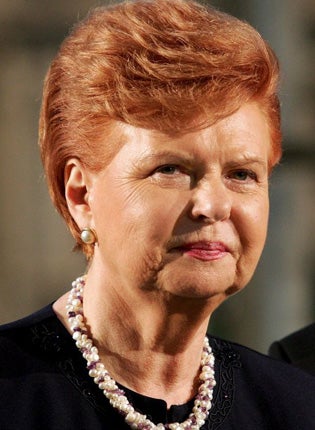'Iron Lady of the North' in late bid for EU's top job
Former Latvian leader enters the fray to change 'undemocratic' gender gap

Your support helps us to tell the story
From reproductive rights to climate change to Big Tech, The Independent is on the ground when the story is developing. Whether it's investigating the financials of Elon Musk's pro-Trump PAC or producing our latest documentary, 'The A Word', which shines a light on the American women fighting for reproductive rights, we know how important it is to parse out the facts from the messaging.
At such a critical moment in US history, we need reporters on the ground. Your donation allows us to keep sending journalists to speak to both sides of the story.
The Independent is trusted by Americans across the entire political spectrum. And unlike many other quality news outlets, we choose not to lock Americans out of our reporting and analysis with paywalls. We believe quality journalism should be available to everyone, paid for by those who can afford it.
Your support makes all the difference.Flame-haired Latvian Vaira Vike-Freiberga, known as the "Iron Lady of the North", is leading a pack of late contenders who have dashed into the closing round of the race to become the EU's first president.
With so much still to play for, diplomats have warned of a long night on Thursday, when EU leaders meet to decide names over dinner. Some suspect the talks will spill over into Friday; others that a decision may be postponed even beyond that, but the Swedish presidency is determined not to let that happen.
Over the past days, another Baltic colleague, Estonia's President Toomas Hendrik Ilves, has added his name to the growing list of presidential hopefuls, which is now thought to include around a dozen potential candidates. Although Tony Blair's chances still look extremely slim, there has been renewed momentum behind a faltering bid by Luxembourg's premier Jean-Claude Juncker and mentions of Spain's ex-leader Jose Maria Aznar. Vaira Vike-Freiberga, who was president of Latvia until 2007 and led the former Soviet state into the EU and Nato, is the only female candidate applying for the newly created job. Known for her charisma and outspoken views, she was an enormously popular leader at home, with thousands of grateful Latvians turning out to lay flowers when she retired.
But she is now nearly 72 and despite a vigorous campaign on Facebook and in a string of European capitals looks unlikely to unseat the current favourite, Belgian Prime Minister Herman van Rompuy.
However, her candidacy chimes with growing demands to appoint a woman as either President or EU High Representative, the number two post created by the Lisbon Treaty. The campaign for female representation was launched a few months ago from the top floors of the European Commission building, where the EU's two female big-shots, Dutch Commissioner Neelie Kroes and her Swedish counterpart, Margot Wallstrom, have their offices.
Both have thrown their weight behind Ms Vike-Freiberga and argue that it is "utterly undemocratic" that more women do not hold senior positions in the EU "given that women account for 52 per cent of the population in Europe". Ms Kroes, the high-profile competition tsar who has taken on corporate giants such as Microsoft, says the gender imbalance is so great that she would rather support a non-Dutch woman over her own Prime Minister, Jan Peter Balkenende, another leading candidate.
"Gender matters more than nationality. There are so many good women in government jobs, they just have to be encouraged to apply," Ms Kroes said. "I think there has to be a female appointment, so that Europeans can see that Brussels is representative."
Several countries appeared to echo this view during a EU foreign ministers meeting in Brussels yesterday. Finnish Foreign Minister Alexander Stubb said: "We would look a bit silly were we not able to elect or choose a female."
French politician Elisabeth Guigou and Britain's Catherine Ashton, the EU trade commissioner are other names doing the rounds.
The gender discussion adds yet another dimension to the complex horse-trading involved in picking candidates for both jobs, which is set to intensify over the coming days. Swedish Foreign Minister Carl Bildt told reporters yesterday: "It's a long time. Three days is approaching eternity in politics."
Join our commenting forum
Join thought-provoking conversations, follow other Independent readers and see their replies
Comments